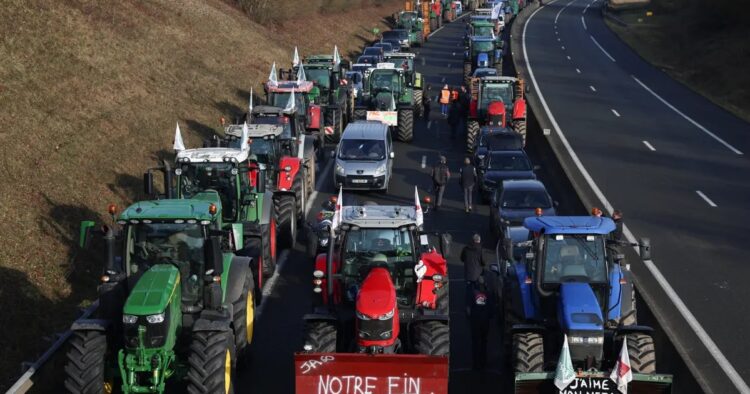In a bold move to express their dissatisfaction with the government’s agricultural policies, protesting farmers encircled Paris on Monday, causing widespread traffic disruptions. Using tractors, hay bales, and other equipment, they blockaded highways leading to the French capital, putting pressure on the new Prime Minister Gabriel Attal.
Protest Demands: The farmers, unhappy with what they perceive as insufficient pro-agriculture measures by Prime Minister Attal, demand changes that would make food production more profitable, easier, and fairer. Their protests come in the wake of the Ukraine war’s repercussions, which have shaken the agricultural industry in France.
Siege of Paris: Convoys of tractors, trailers, and harvesters deployed by the farmers formed a “siege” around Paris, aiming to gain more concessions from the government. Some protesters even brought reserves of food and water, prepared to stay at the barricades until their demands are met.
Farmers’ Perspective: “We’ve come to defend French agriculture,” said Christophe Rossignol, a 52-year-old farmer. The protesters feel ignored by government ministers who they accuse of not understanding the challenges faced by farmers. Placards declaring “No food without farmers” and “The end of us would mean famine for you” highlighted their concerns.
Government Response: In response to the protests, the government deployed 15,000 police officers, mainly in the Paris region, to prevent protesters from entering the capital. Armored vehicles were stationed at Paris’ Rungis market, a hub for fresh food supplies. The government aims to address the crisis and find solutions promptly.
International Impact: Farmers in neighboring Belgium also joined the protests, setting up barricades to block traffic, particularly into the capital, Brussels. The demonstrations are part of a broader trend of global food crises exacerbated by Russia’s prolonged war in Ukraine, a major food producer.
Reasons for Protests: Farmers argue that higher prices for inputs like fertilizer and energy, combined with over-regulation and subsidies, have impacted their incomes. They also express concerns about competition from countries with lower production costs and fewer constraints, citing Ukrainian sugar producers as an example.
Protest Duration and Outlook: Farmers at the barricades around Paris and in Belgium aim to continue protesting until at least Thursday. This coincides with a summit in Brussels where leaders from the European Union’s 27 nations will discuss financial support for Ukraine. The protests add to existing challenges, with taxi drivers organizing drive-slow protests on Monday, contributing to traffic chaos in various parts of the country.
The farmers’ protests underscore the deep-rooted issues within the agricultural sector and highlight the economic and social disparities between urban and rural areas in France. As the government and protesters engage in a standoff, the impact on daily life, commerce, and transportation continues to escalate, with the international community closely watching the developments.

















Comments